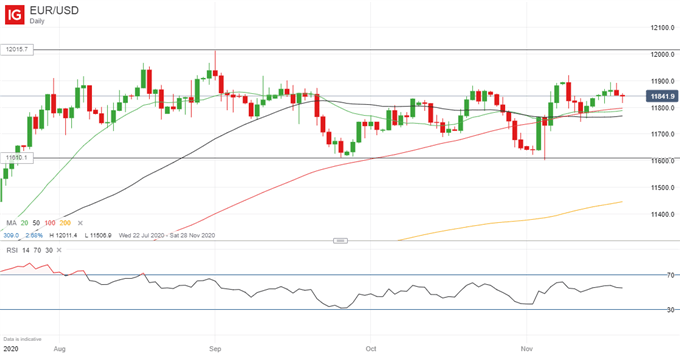Euro Forecast: EUR/USD Outlook Worsens After EU Recovery Fund Vetoed
FUNDAMENTAL EURO FORECAST: BEARISH
- While traders were focused last week on news of vaccines to control the coronavirus pandemic, little attention was paid to news that Poland and Hungary are blocking the EU’s €750 billion COVID-19 recovery fund.
- That could be a mistake as the fund would be an important tool in repairing the damage caused to the EU by the spread of the virus, and the Euro will likely be weaker without it than with it.
EURO PRICE OUTLOOK DETERIORATES
Poland and Hungary decided last week to block an important step towards establishing the EU’s €750 billion COVID-19 recovery fund, objecting to a clause tying funding with adherence to the rule of law. The right-wing governments in both Warsaw and Budapest have been accused of undermining the independence of their courts, media, and non-governmental organizations, so they fear that the clause could cost them billions of Euros in EU funding.
Their veto was perhaps inevitable, but has still blocked both the rescue package and the EU Budget, and that is potentially bad news for Euro bulls.
EUR/USD PRICE CHART, DAILY TIMEFRAME (JULY 22 – NOVEMBER 19, 2020)
Chart by IG (Click to enlarge)
For sure, this is a long-term rather than a near-term concern for the markets, but it will still take all of German Chancellor Angela Merkel’s famed negotiating skills to come up with a package acceptable to all 27 EU countries. If no agreement is reached, the outlook for the EU economy will be clearly worse than it would be with the funding in place, and that would leave the European Central Bank to provide the stimulus needed because of the economic slump caused by the epidemic.
The Europe director of the World Health Organization said last week there a “small sign” that the latest resurgence of coronavirus cases in the region is slowing, but still warned of “six tough months” ahead.
EUROZONE WEEK AHEAD: PMIS IN THE SPOTLIGHT
Turning to the more immediate future, the Eurozone calendar this coming week is dominated by purchasing managers’ index data due Monday for France, Germany, and the bloc as a whole. The PMIs will be the first major figures for the Eurozone in November, so this should be an important indicator of its economic resilience.
The PMIs are followed on Tuesday by the Ifo business climate index for Germany, on Thursday by the GfK measure of German consumer confidence, and on Friday by the monthly set of Eurozone sentiment data; and together these should give a much clearer picture of how the economy is performing in the year’s final quarter.
Disclosure: See the full disclosure for DailyFX here.
Comments
 No Thumbs up yet!
No Thumbs up yet!




